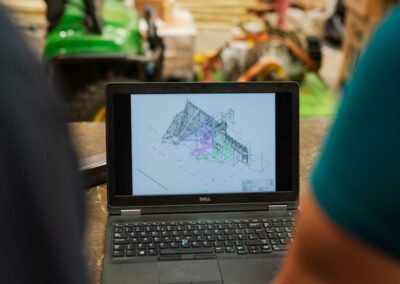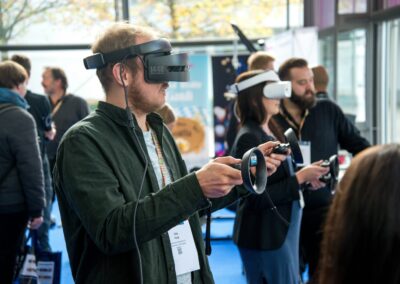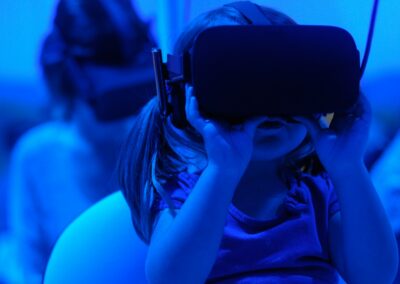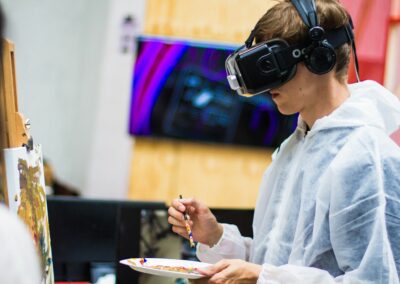Understanding the Psychological Effects of Virtual Identities
Embodiment in Virtual Worlds
The psychological impacts of embodying different virtual avatars in virtual worlds are profound and multifaceted. This phenomenon is particularly significant in regions like Saudi Arabia, the UAE, Riyadh, and Dubai, where digital adoption is rapidly accelerating.
When users create and inhabit avatars, they often experience a sense of embodiment that can alter their self-perception. This psychological effect, known as the “Proteus Effect,” suggests that the characteristics of one’s avatar can influence behavior and attitudes in the real world. For instance, an individual who adopts a confident and assertive avatar may begin to exhibit these traits in their offline interactions. This blending of virtual and real identities underscores the transformative potential of virtual worlds.
Behavioral Changes and Social Interaction
The impact of virtual avatars extends beyond individual self-perception to influence social behavior and interaction. In virtual environments, users can experiment with different identities and behaviors, often leading to enhanced social skills and confidence. This is particularly relevant in conservative cultures where social norms may restrict certain expressions of identity.
In Saudi Arabia and the UAE, where cultural and social norms are deeply ingrained, virtual worlds offer a safe space for individuals to explore different aspects of their personality. This can lead to greater self-awareness and personal growth. Moreover, the anonymity provided by virtual avatars allows users to engage in social interactions without the fear of judgment or repercussion, fostering a more open and inclusive digital community.
Impact on Mental Health and Well-Being
While the use of virtual avatars can have positive psychological impacts, it is also essential to consider potential negative effects. Prolonged immersion in virtual worlds may lead to issues such as identity confusion and social isolation. Users who become too attached to their virtual identities might struggle to reconcile these with their real-world personas, leading to cognitive dissonance.
In regions like Riyadh and Dubai, where digital connectivity is high, it is crucial to promote a balanced approach to virtual engagement. Mental health professionals and educators can play a pivotal role in guiding users on healthy virtual interactions, ensuring that the psychological benefits of virtual worlds are maximized while mitigating potential risks.
The Role of Technology in Shaping Virtual Identities
Artificial Intelligence and Behavioral Insights
Artificial Intelligence (AI) significantly enhances the experience of embodying virtual avatars by providing personalized and adaptive interactions. AI algorithms can analyze user behavior and preferences to create more realistic and relatable virtual environments. This technology is particularly relevant in Saudi Arabia and the UAE, where AI adoption is part of broader digital transformation strategies.
By leveraging AI, virtual worlds can offer tailored experiences that resonate with users on a personal level. This can enhance the psychological impact of virtual avatars, making interactions more meaningful and impactful. For example, AI-driven virtual coaches can provide personalized guidance and support, helping users develop specific skills and behaviors.
Blockchain for Identity Security
Blockchain technology plays a crucial role in ensuring the security and authenticity of virtual identities. By decentralizing data storage and using cryptographic techniques, blockchain can protect user identities from theft and misuse. This is particularly important in maintaining the integrity of virtual worlds, where user trust is paramount.
In the context of Dubai and Riyadh, where blockchain initiatives are actively pursued, integrating this technology into virtual worlds can enhance user confidence and participation. Secure identity management systems enabled by blockchain can ensure that users have control over their virtual identities, fostering a safer and more trustworthy digital environment.
The Metaverse as a Platform for Inclusive Experiences
The metaverse represents the next evolution of virtual worlds, offering immersive experiences that combine elements of virtual reality (VR), augmented reality (AR), and blockchain. This platform has the potential to create inclusive and diverse digital spaces where users can explore different identities and experiences.
For business leaders and entrepreneurs in the UAE and Saudi Arabia, the metaverse offers opportunities to innovate and create value. By developing inclusive virtual experiences, businesses can cater to a wide range of user needs and preferences. This can include virtual workshops, social events, and educational programs designed to be accessible and engaging for all users.
Conclusion
The psychological impacts of embodying different avatars in virtual worlds are profound, influencing user behavior, self-perception, and social interaction. By leveraging technologies such as AI and blockchain, virtual worlds can offer secure and personalized experiences that enhance these psychological effects. The metaverse, with its immersive capabilities, represents a promising platform for further innovation and inclusivity.
In regions like Saudi Arabia, the UAE, Riyadh, and Dubai, where digital transformation is a key focus, understanding the psychological impacts of virtual avatars can inform strategies for creating more engaging and supportive digital communities. By embracing these technologies and insights, business leaders and policymakers can contribute to a more inclusive and dynamic digital ecosystem, ensuring that all individuals can thrive in both virtual and real worlds.
#VirtualAvatars #PsychologicalImpacts #VirtualWorlds #SelfPerception #UserBehavior #SaudiArabia #UAE #Riyadh #Dubai #ArtificialIntelligence #Blockchain #TheMetaverse #ExecutiveCoaching #GenerativeAI #BusinessSuccess #LeadershipSkills #ManagementSkills #ProjectManagement























